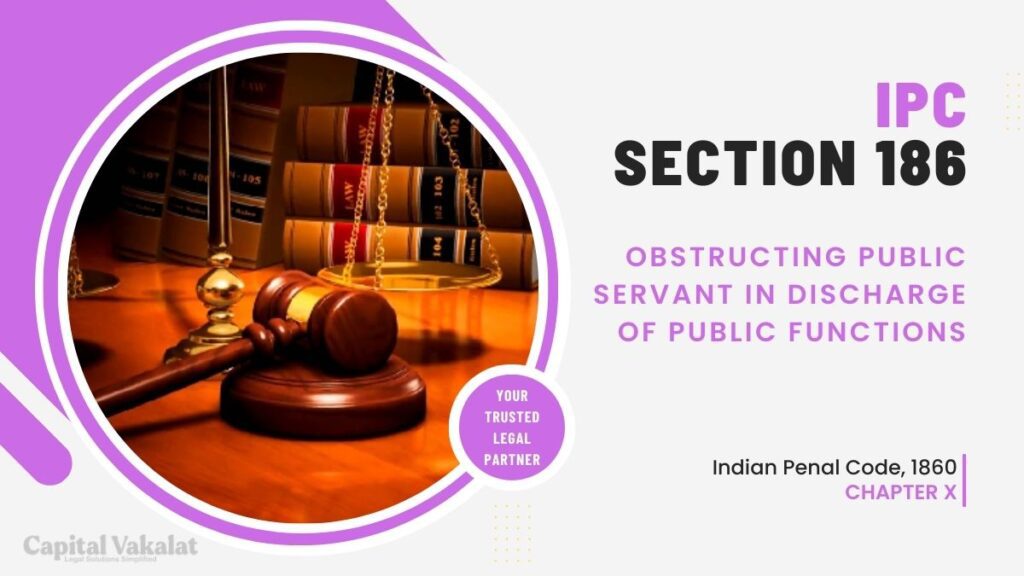In the vast tapestry of legal provisions in India, Section 186 of the Indian Penal Code (IPC) holds a significant place. It deals with the obstruction of a public servant while they are discharging their public functions. In this article, we will delve into the intricacies of Section 186 IPC, its elements, punishments, case studies, and its implications on society.

India, a land known for its diverse culture and complex societal dynamics, relies on a well-established legal system to maintain law and order. The Indian Penal Code, often referred to as the IPC, plays a pivotal role in defining various offenses and their corresponding penalties.
Understanding Section 186 IPC
What is IPC?
The Indian Penal Code, established in 1860, is the cornerstone of criminal law in India. It encompasses a wide array of criminal offenses and their corresponding punishments. Section 186 is one such provision that deals with offenses against public servants.
The Significance of Section 186
Section 186 IPC is a vital legal tool in ensuring the smooth functioning of government machinery. It aims to protect public servants from unwarranted obstructions while they perform their official duties.
Elements of Offense
To understand Section 186 better, let’s break down the key elements of the offense it addresses:
Obstruction
Obstruction in this context refers to any deliberate act that hinders, impedes, or interferes with a public servant’s lawful discharge of their public duties.
Public Servant
A public servant can be any individual holding a public office, including government employees, law enforcement officers, and elected officials.
Discharge of Public Functions
The section specifically pertains to offenses that occur while a public servant is performing their official functions. These functions may vary but often include maintaining law and order, implementing government policies, and providing essential services to citizens.
Punishments under Section 186 IPC
Section 186 IPC prescribes penalties for those found guilty of obstructing public servants. The punishment can include imprisonment and/or a fine, depending on the severity of the offense.
Precedents and Case Studies
To understand the practical implications of Section 186, it’s essential to examine past cases and legal precedents. Several instances have shed light on the interpretation and application of this provision.
The Role of Intent
One critical aspect of Section 186 IPC is the intent of the accused. It is essential to establish that the obstruction was intentional and not inadvertent, making the accused’s mental state a crucial element in determining guilt.
Defenses Against Section 186 IPC
While Section 186 IPC is designed to protect public servants, there may be circumstances where the accused can present valid defenses. These defenses may include lack of intent, mistaken identity, or acting under legal authority.
Recent Amendments
Legal provisions evolve with time, and Section 186 IPC is no exception. Recent amendments and changes in the law have refined the interpretation and application of this section.
Impact on Society
Understanding the implications of Section 186 IPC on society is crucial. It serves as a deterrent against interference with public servants and ensures that government functions smoothly.
Challenges in Implementation
Despite its significance, Section 186 IPC faces challenges in its effective implementation. Overcoming these challenges is essential to uphold the rule of law and protect public servants.
Conclusion
In conclusion, Section 186 IPC plays a crucial role in upholding the integrity of public servants and ensuring the efficient functioning of government machinery. It’s a legal provision designed to maintain law and order in a diverse and complex society like India.
Frequently Asked Questions
What constitutes obstruction under this section?
Obstruction under Section 186 IPC refers to any deliberate act that hinders, impedes, or interferes with a public servant’s lawful discharge of their public duties. It involves intentional interference with their work.
Are there any specific defenses against Section 186 IPC?
Yes, there are defenses available. Accused individuals can claim lack of intent, mistaken identity, or acting under legal authority as valid defenses against charges under Section 186 IPC.
How have recent amendments impacted this provision?
Recent amendments to Section 186 IPC have refined the interpretation and application of the law. These changes are designed to ensure its effectiveness and relevance in contemporary society.
What is the significance of Section 186 IPC in maintaining law and order in India?
Section 186 IPC is significant in upholding the integrity of public servants and ensuring the efficient functioning of government machinery. It acts as a deterrent against interference, helping maintain law and order in a diverse and complex society like India.